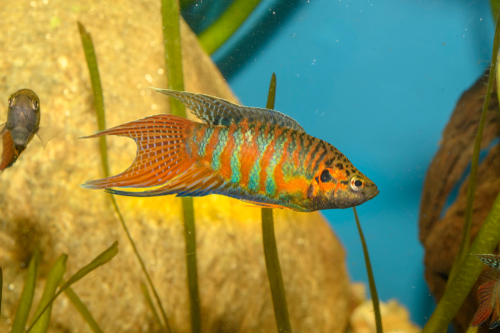Hoping to find a great tank mate for your Paradise Fish? It can be tricky, but easier with our list of the 15 Best Paradise Fish Tank Mates!
The 15 Best Paradise Fish Tank Mates are the fish that thrive in the same tank conditions, eat a dissimilar diet, and can handle the Paradise Fish’s aggressive nature. Usually, these are fish like the Bristlenose Pleco or Silver Dollar.
In this article, we will cover all of the best candidates for tank mates for the Paradise Fish. We’ll even show you what we like about each, and what you should know before deciding. Let’s get started!
Contents
Paradise Fish Tank Mates – What You Need to Know
The most important things to consider when picking out tank mates can be found below.
Temperament
Paradise fish are, unfortunately, quite aggressive with certain species. They have earned the reputation of a bully! To avoid casualties, you need fish that are either fast enough to avoid the Paradise Fish, or big enough to intimidate it out of being so nasty.
Size
A Paradise Fish’s size is only 2 inches, sometimes 2.5 inches. This means that while it can be a bit of a bully, there are many larger fish that you can keep with it which it wouldn’t dream of attacking. Still, go too large with your tank mate selection and the Paradise fish could become lunch, so be careful!
Competition
Competition for food can be fierce in a tank with poor tank mate choices. The Paradise Fish eats mosquito larvae, brine shrimp, and flies; a high protein diet. Get tank mates that can fend for themselves or eat a different diet during feeding time!
Parameters ; Tank Setup
The water for a Paradise Fish should be about 20 gallons in terms of tank size. The temperature of a Paradise Fish’s tank should be 62 to 82 Fahrenheit, and there should be plenty of plants to break up the little fighter’s eyeline! Tank mates should thrive in the same conditions.
15 Best Paradise Fish Tank Mates
- Bristlenose Pleco
- Bala Shark
- Upside Down Catfish
- Featherfin Squeaker
- Cuckoo Catfish
- Giant Gourami
- Silver Dollar
- Neon Tetra
- Kuhli Loach
- Tiger Barb
- Flame Tetra
- Bleeding Heart Tetra
- Congo Tetra
- Emperor Tetra
- Harlequin Rasbora
Let’s take a closer look at each of these potential tank mates to see why they’d make a good fit.
Also read:
- Leopard Puffer Tank Mates
- Bumblebee Cichlid Tank Mates
- Cardinal Tetra Tank Mates
- Hillstream Loach Tank Mates
1. Bristlenose Pleco
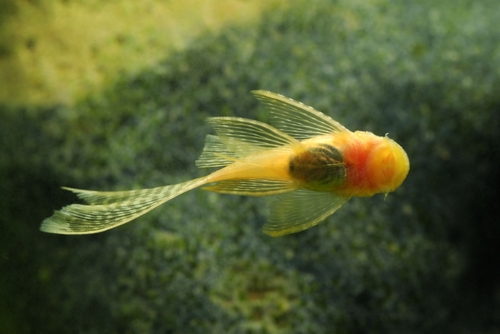
- Scientific Name: Ancistrus cirrhosus
- Adult Size: 5 inches
- Compatible With: Paradise Fish
- Care Level: easy
- Origin: Amazon
The bristlenose pleco goes by many names, including the bushy nose fish! This is because of its many whiskers. This pleco will stay at the bottom of the tank.
It will cause no trouble to your Paradise fish, and it too big to be bullied!
Pros of keeping with Paradise Fish :
- Too big to be bullied
- Cleans up bottom of tank
Cons of keeping with Paradise Fish :
- None!
2. Bala Shark
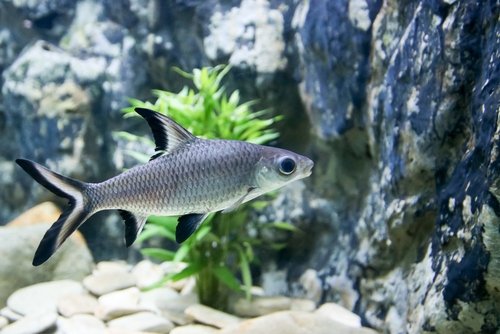
- Scientific Name: Balantiocheilos melanopterus
- Adult Size: 13 inches
- Compatible With: Paradise Fish
- Care Level: Difficult
- Origin: Malaysia
The Bala shark is a large fish, but as long as there is plenty of room, it will not harm the smaller Paradise Fish. These fish have split tails and like to school, but beware! They are very large.
Pros of keeping with Paradise Fish
- No food competition
- Too big to be bullied
Cons of keeping with Paradise Fish :
- Large Fish
3. Upside Down Catfish
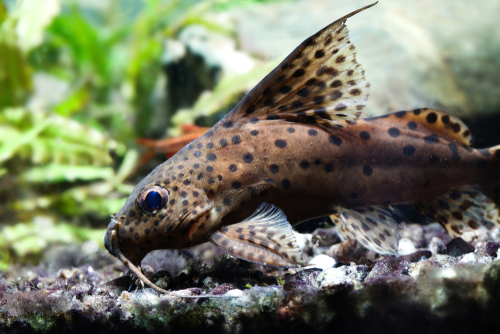
- Scientific Name: Synodontis nigriventris
- Adult Size: 4 inches
- Compatible With: Paradise Fish
- Care Level: Easy
- Origin: Central Africa
This interesting little catfish is very peaceful! It tends to live in schools, and is bigger than the Paradise fish, so it shouldn’t be bothered.
Upside Down Catfish are mottled, and named after the orientation of their eyes and coloration, making it appear as if they swim upside down!
Pros of keeping with Paradise Fish :
- No food competition
- Too big to be bullied
Cons of keeping with Paradise Fish :
- None
4. Featherfin Squeaker
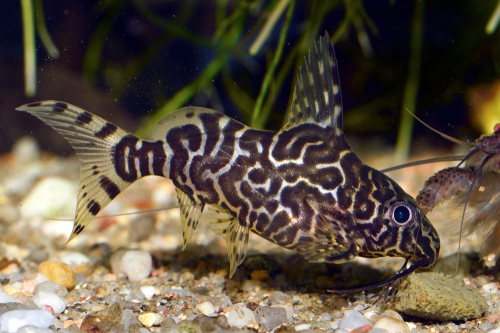
- Scientific Name: Synodontis eupterus
- Adult Size: 10 inches
- Compatible With: Paradise Fish
- Care Level: Difficult
- Origin: Central America
This catfish has a thick body. It can be difficult for new aquarium hobbyists to handle because it is so large, with a feathery-spotted type of fin.
The Featherfin squeaker is peaceful. It is a long-lived fish that is too large to be bothered by the Paradise Fish.
Pros of keeping with Paradise Fish :
- No aggression
- Too big to be bullied
Cons of keeping with Paradise Fish :
- Large Fish
5. Cuckoo Catfish
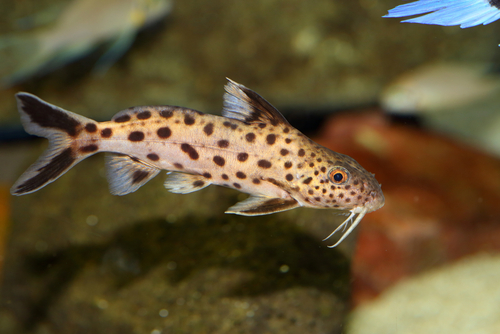
- Scientific Name: Synodontis multipunctatus
- Adult Size: 10 inches
- Compatible With: Paradise Fish
- Care Level: Difficult
- Origin: Africa
The next fish on our list is another example of the catfish family! Similar to its brethren, the cuckoo catfish is fairly peaceful.
Cuckoo catfish are spotted with gold bodies and interestingly black and white fins. They have long whiskers which resemble coral fronds!
Pros of keeping with Paradise Fish :
- No aggression
- No food competition
Cons of keeping with Paradise Fish :
- Large Fish
6. Giant Gourami
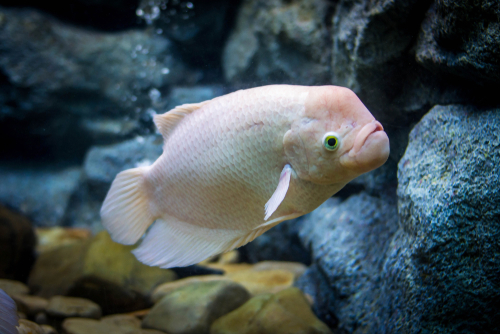
- Scientific Name: Osphronemus goramy
- Adult Size: 18 inches
- Compatible With: Paradise Fish
- Care Level: Difficult
- Origin: Southeast Asia
The giant gourami is one of the largest types of fish in its species. It can come in a variety of types and colors, so there is one for all your aquarium needs!
Though the giant gourami can sometimes cause trouble, it is likely too big to bother with your Paradise Fish!
Pros of keeping with Paradise Fish :
- No aggression
- No food competition
Cons of keeping with Paradise Fish :
- Large Fish
7. Silver Dollar
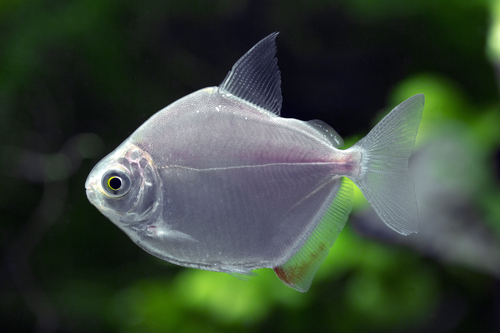
- Scientific Name: Metyinnis argentus
- Adult Size: 16 inches
- Compatible With: Paradise Fish
- Care Level: Difficult
- Origin: Brazil
Named for the round and shiny resemblance to a coin, the Silver Dollar Fish makes a great addition to just about any tank. It will cause no harm to the Paradise Fish.
Be warned, however, that the Silver Dollar is large. To make matters more complicated, it likes to have more than one of its own kind around.
Pros of keeping with Paradise Fish :
- No aggression
- No food competition
Cons of keeping with Paradise Fish :
- Large Fish
8. Neon Tetra
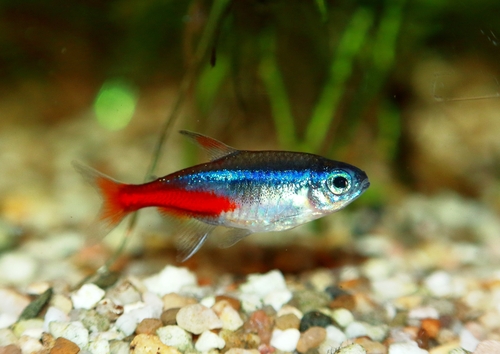
- Scientific Name: Paracheirodon innesi
- Adult Size: 1.5 inches
- Compatible With: Paradise Fish
- Care Level: Easy
- Origin: Colombia, Peru
The neon tetra is characterized by its small size and bright colors. It is generally a neon pink sandwiching with a neon blue color.
The Neon tetra may be smaller than the Paradise Fish, but with 6 or more of its own kind it won’t be bullied.
Pros of keeping with Paradise Fish :
- No aggression
- No food competition
Cons of keeping with Paradise Fish :
- None!
9. Kuhli Loach
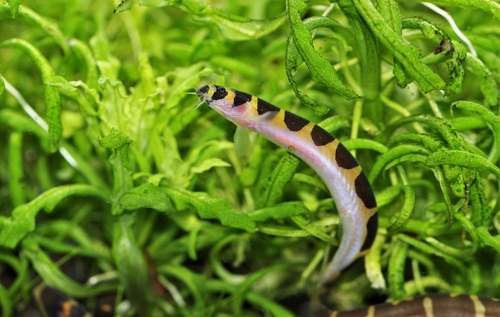
- Scientific Name: Pangio kuhli
- Adult Size: 5 inches
- Compatible With: Paradise Fish
- Care Level: Easy
- Origin: Thailand, Borneo
The Kuhli Loach is a great companion for the Paradise Fish. Not only is it too big to be bullied by the tinier fish, but it is more muted in color, offering pleasing visual contrast in your tank.
The kuhli loach is also long and slender, looking more like a snake than a fish. It is often iridescent like a pearl with yellow and black spots.
Pros of keeping with Paradise Fish :
- No aggression
- No food competition
Cons of keeping with Paradise Fish :
- None!
10. Tiger Barb
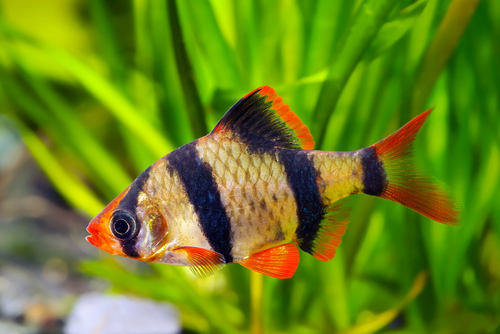
- Scientific Name: Barbus tetrazona
- Adult Size: 3 inches
- Compatible With: Paradise Fish
- Care Level: Easy
- Origin: Indonesia
The Tiger Barb is a fan-favorite in aquarium communities. It is fast, playful, and fun to watch. Bonus: it won’t disturb or be disturbed by your Paradise Fish!
Tiger Barbs are the color of a sunset, pale, with black stripes. They have a delightful triangular shape.
Pros of keeping with Paradise Fish :
- No food competition
- No aggression
Cons of keeping with Paradise Fish :
- None!
11. Flame Tetra
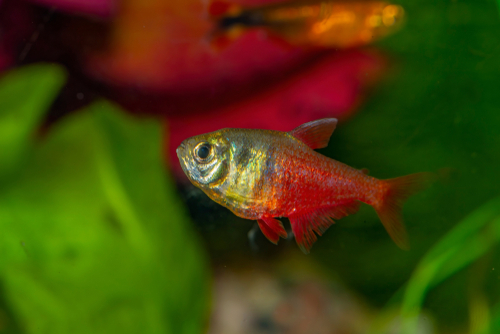
- Scientific Name: Hyphessobrycon flammeus
- Adult Size: 1 inch
- Compatible With: Paradise Fish
- Care Level: Easy
- Origin: South America
The Flame Tetra is a hot-colored Brazilian fish that is simply too quick, and usually too surrounded by a school of its friends, to be easily bullied by the Paradise Fish.
These fish look a lot like regular goldfish, only much smaller. They are a sunny gold color with nearly transparent fins.
Pros of keeping with Paradise Fish :
- No aggression
- No food competition
Cons of keeping with Paradise Fish :
- None!
12. Bleeding Heart Tetra
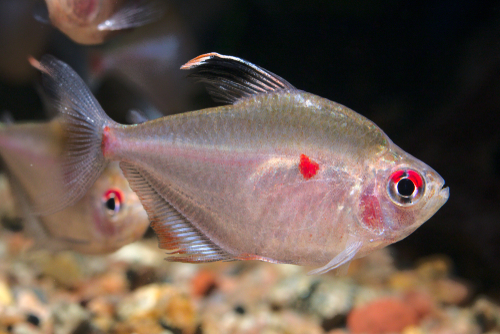
- Scientific Name: Hyphessobrycon erythrostigma
- Adult Size: 2 inches
- Compatible With: Paradise Fish
- Care Level: Easy
- Origin: Amazon
The Bleeding Heart Tetra eats mostly meat but is peaceful. This tiny fish comes in beige, silver, and orange coloration with the red spotting on its sides that gives it its name.
Bleeding Heart Tetras are too quick and have strength in schools of their own kind, preventing bullying from a Paradise Fish.
Pros of keeping with Paradise Fish :
- No aggression
Cons of keeping with Paradise Fish :
- Some potential for food competition.
13. Congo Tetra
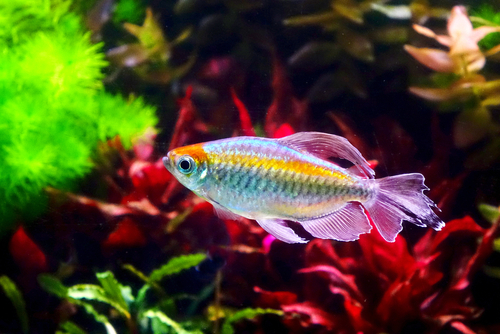
- Scientific Name: Phenacogrammus interruptus
- Adult Size: 3 inches
- Compatible With: Paradise Fish
- Care Level: Easy
- Origin: Congo
The congo tetra is named for the basin it was found in. This species is peaceful as long as it can live comfortably in a school of 6 or more.
This fish is silver to blue capped with a lovely hot orange stripe. It has interestingly shaped silver fins.
Pros of keeping with Paradise Fish :
- No aggression
- No food competition
Cons of keeping with Paradise Fish :
- None!
14. Emperor Tetra
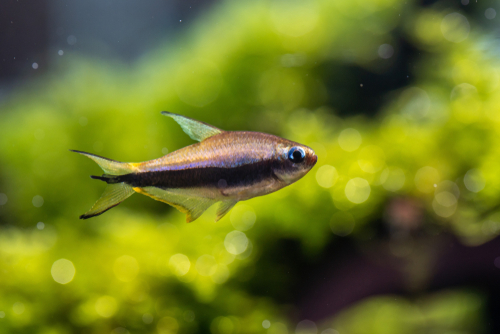
- Scientific Name: Nematobrycon palmeri
- Adult Size: 2 inches
- Compatible With: Paradise Fish
- Care Level: Easy
- Origin: Colombia
Also called the blue rainbow tetra, this fish is peaceful, as well. It mostly keeps to the middle of the tank and likes to live in a school.
Emperor tetras ate plain in color at first glance. However, in certain lights, these little fish are dazzling in iridescence!
Pros of keeping with Paradise Fish :
- No aggression
- No food competition
Cons of keeping with Paradise Fish :
- None!
15. Harlequin Rasbora
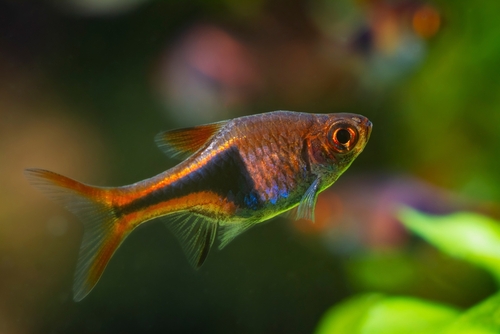
- Scientific Name: Trigonostigma heteromorpha
- Adult Size: 1 inch
- Compatible With: Paradise Fish
- Care Level: Medium difficulty
- Origin: Malaysia
The Harlequin Rasbora is small, but again, it likes to be around other fish. Besides, it keeps to itself near the top of the tank, sometimes hiding among obstacles in the middle.
The Harlequin Rasbora is a bright orange clementine color with a black patch near it’s tail.
Pros of keeping with Paradise Fish :
- No aggression
- No food competition
Cons of keeping with Paradise Fish :
- None!
In Conclusion
To sum everything that we’ve covered up, the Paradise Fish can survive best with the 15 Best Paradise Fish Tank Mates! These are fish that are too big to be bullied, but too small to eat the paradise fish, and survive in the same conditions. Try the Flame Tetra or Bala Shark and you’ll have a lovely but peaceful aquarium!

Ian Sterling, founder of Fishlab.com, began his aquarium journey over 30 years ago, driven by a deep fascination for fish and their diverse personalities. His website, Fishlab.com, is dedicated to making fishkeeping accessible and enjoyable, offering beginner-friendly guidance, expert insights, and a community for aquarists to connect and share experiences.


